- Home
- James Phelan
Red Ice Page 19
Red Ice Read online
Page 19
Fox watched down the street as a van-load of hard-hat workers did their thing by the palace’s wall, a few guys around an open manhole on the pavement running tubing into the ground. Zoe had clocked them too. She approached the armed palace guards—in ceremonial garb, standing next to a guard shelter the size of a phone booth—and motioned to the workers. The guard explained they were undertaking precautionary work on the gas main following the Russian Embassy explosion.
At the front of the queue Zoe showed her ID to the uniformed cop manning the gate and explained she was looking after a reporter, Fox. Fox wore Renard’s Le Figaro press pass on a lanyard, backwards so that PRESS was visible, rather than Renard’s name and photo.
Zoe turned the card over, her fingers obscuring the photo, stated Renard’s name and Le Figaro—and they were waved through to the waiting area.
Boris Malevich had been all smiles as the palace guards accepted their credentials and his guys busied themselves around the gas main on Rue du Faubourg Saint-Honoré. Not a few minutes later, he saw that face again: Lachlan Fox.
He watched him disappear into the palace with the female cop. Shit! He pulled his BlackBerry out with shaky hands; it was still a long time until his next scheduled check-in. Lavrov couldn’t help him this time. Shit.
“Hurry up,” he told one of the guys. At least they knew what they were doing—they’d carried out the Russian Embassy job without any problems. He leaned into the van, opened up a compartment under the hoses and revealed a flat case that matched the bottom of the van. He opened it up—gas masks and a full assortment of the finest Fabrique Nationale de Herstal gear: P90 assault rifles, FN Five-seveN pistols and a fortymillimetre grenade launcher. He hesitated just a moment then took a pistol—weightier than the compact Glock he’d ditched back at the warehouse—chambered a round, checked the safety and trigger mechanisms, put it to the side, ready but concealed, and closed the hidden tray. The other two would no doubt take the heavier gear. “How long until you’ll be ready?”
“Five minutes,” the guy replied.
Malevich looked back towards the palace entrance. Security was not as tight as normal, because the president was in Shanghai for the G20 Summit. A couple of uniformed armed guards wandered in and out every now and then, looking up and down the street. He glanced back to his two guys, working on the pipes, attaching C4 charges underneath the gas lines. They’d need to hurry up …
Zoe and Fox had a chaperone. Poor guy had the trifecta: short, bald and fat. Dressed in some kind of official garb, he looked like he’d been showing tourists around since the last war. Zoe was doing a great job flirting, and Fox was confident the man would soon do anything she asked. They headed up some stairs to the first floor, finding the opulent palace surprisingly empty—Fox knew it wasn’t just a residence for the President, it was his office, as well as that of the First Lady, and plenty of their staff. Then again, it was Saturday and the boss was away, and they may adhere to the thirty-five-hour work-week or whatever it was the French did these days.
The man was stopping here and there to provide details about the palace in English, for Fox’s benefit. They didn’t need to bother with any subterfuge for Baldy’s sake, and once he learned that Fox was Australian rather than American, he treated the reporter like a true compatriot.
Fox stood next to him and Zoe as they paused to admire the English-style gardens at the rear of the palace—they stretched out towards the Champs Elysées. They continued on the tour, Baldy setting a surprisingly quick pace: he walked fast and talked slow, like a hobbit on crack.
“This building was once the home of the mistress of King Louis XV,” he said, the twinkle in his eye directed towards Zoe. “A different time, then, no? I fear we have lost much romance, as a people…”
“Oh, I don’t know. It’s now home to an Italian-born former model and a five-foot tall, twice-divorced politician of Hungarian descent,” Fox said under his breath, just audible enough for Zoe to shoot him a look. “Le Président Bling-Bling or something, don’t they call him?”
“I am sorry, sir?” Baldy said, stopping and turning around. “I am a little hard of hearing.” He didn’t seem annoyed, but he wasn’t smiling. Then again, the French didn’t exactly give away their smiles for free.
“Just saying what lovely carpets there are here,” Fox said, smiling. “And how they match the drapes.”
“Yes, you will find the attention to detail here quite extraordinary,” he said, as Zoe linked her arm through his and led him down the corridor. “The architect was Armand-Claude Mollet, the design brief was for an hôtel particulier, fronted by an entrance court and backed by a garden. Finished and decorated by 1722…”
Malevich was about to ask for an update on where the guys were with rigging the C4 charges and detonators on the gas main, when one of the guards approached, both hands on the submachine gun strapped across his Kevlar body armour.
“How much longer?” the guard asked one of the square-jawed grunts working over the open manhole.
“Not long,” Malevich replied, confident his French was as good as the next Parisian. “Fifteen minutes or so.”
The guard looked amused. He took his hand off his gun’s forward-grip and reached into his pocket. “You sound like the guys who come to fix the plumbing at my apartment. I bet fifteen minutes really means three or four days for you too, hey?”
Malevich smiled, trying to appear sincere.
“Not when we are working for the boss,” he replied, pointing his thumb at the palace wall that abutted the pavement a few metres from them.
The guard smiled, brought out his hand and a pack of smokes, shook one loose and took it out with his lips.
“I would light that back at your post,” Malevich said, gesturing to the hole in the ground and mimicking an explosion with both hands.
The guard grunted and headed back towards the gate.
As soon as he was gone, Malevich’s men went back to their real work fixing the charges. Malevich leaned against the van and took a few deep breaths—he felt like he’d run a marathon.
“… and though it has undergone many modifications since, it remains a fine example of the French classical style,” Baldy said, showing Fox and Zoe a reception hall. Fox motioned for Zoe to hurry the guy along and she gave an almost imperceptible, I’m trying.
“During the French Revolution and the Napoleonic Wars, the building receded in importance, becoming a furniture warehouse, then a print factory, then a dance hall. Russian Cossacks camped at the Elysée when they occupied Paris in 1814, or so they say—I am not entirely convinced, but it’s something—”
“How about 1867?” Fox asked, hoping to skip a few decades.
The man looked at him, interest in his eyes.
“That’s quite a specific date,” he said, staring off at a tapestry on the wall. “Let me see … 1853 saw the coup d’état that ended the Second Republic, Napoleon III charged the architect Joseph-Eugène Lacroix with renovations, and while he lived in the Tuileries Palace, he kept the Elysée as a discreet place to meet his mistresses, moving, some say, between the two palaces through a secret underground passage.”
He gave Fox a wink about the mistress arrangement and Fox smiled and acted impressed.
“In regards to 1867, that is when Lacroix completed his work,” he explained, waving his hand towards the cornice moulding and detailed panel inlays in the walls. “It was completed in time for the Universal Exposition of that year, and foreign sovereigns—including Tsar Alexander II, the Sultan Abdul-Aziz of Turkey and Emperor Franz-Josef of Austria—were received here. The essential look of l’Elysée has remained the same, and from about then on, during the French Third Republic, she became the official presidential residence.”
“So it has been unchanged since?”
“Oh, I wouldn’t say unchanged,” he answered, “but mainly just cosmetic alterations and repairs, a few modern upgrades. Hard to improve on perfection, you see?”
/>
“And what about the president’s study?” Zoe asked, her hand on the man’s arm. “Could we please see that?”
“He—he has a couple,” the man replied, and Fox’s heart skipped a beat. A couple?
“The original one from 1867?” Zoe pressed. “The one in all the state photos. The gilded salon, I think it is called?”
“Yes, that is still used, especially for receptions, but it’s not really somewhere we show visitors, unless you have an appointment with—”
“Monsieur, surely a quick look…” Zoe said, her voice low, speaking close to his good ear. “After all, our President is abroad.”
He gazed at her face for a moment and then seemed to melt under her charm.
“Yes, this way,” he said, leading them down the hall. Fox’s smile was as big as the Cheshire Cat’s.
Malevich’s guys gave him the thumbs-up and headed back to the van.
“We back this van fifty metres down the road, away from the gate,” the bigger one said, revealing a little plastic box with a button, much like a garage door opener. “Hit this, it will blow this wall and the path here, ten metres at least; nothing left but a big opening.”
“Okay,” Malevich said. He thought back to their little red Renault van parked around the corner, masquerading as a fireresponse medical unit. “What about the guards up ahead?”
“As soon as that idiot goes back inside, we move,” the big guy replied. “We reverse, we detonate, and I keep hitting the entrance with the CS grenades while you two go in through the palace’s new door and get what you need.”
“Good, get ready.”
“L’Elysée certainly is beautiful,” Fox said as they reached a biometric security checkpoint. It was a glass wall that split the hallway, a piece of ultra-tech kit amid the baroque.
“She is my mistress,” Baldy said, guiding his open palm onto the mirrored scanning surface, a thin line of green light passing beneath his hand making the heavy bulletproof glass doors hiss open.
Fox followed Zoe into a large, ornate sitting room filled with elegant Second Empire furniture. Everything he’d seen was so grand, every room so impressive, that he’d have believed any one of them could have served as the President’s ceremonial study. Through the tall windows to his left was the sun-drenched garden, a boxwood maze framed by blooming wisteria, gravel paths winding to a parade-ground-sized courtyard.
“This is the salon,” Baldy announced, opening double doors by the windowed wall and leading them into yet another luxurious room. This one had a small desk, several armchairs, a sofa and sitting chairs, and more large windows overlooking the ceremonial gardens.
“Beautiful,” Fox said.
“Isn’t it?” Baldy replied, pleased with himself. He stood by the door, watching them intently as they moved to the first window to admire the view. “The Salon Dora, it is called, the Gilded Salon.”
“Faint,” Fox whispered into Zoe’s ear.
“What?” she replied out of the side of her mouth, turning to smile at Baldy, who gave a little wave back.
Fox crossed his arms, brushed up slightly against Zoe and pinched her arm.
“Ouch—”
She moved her hand to rub her arm and Fox put her in a wrist-lock and dropped her to the floor, her face covered—eyes, mouth, everything—with his other hand.
“She’s fainted!” Fox said loudly, so that Baldy could hear and Zoe got the idea. He felt her go limp and he released the pressure.
“Sacrebleu!” Baldy exclaimed, his pudgy little hands up to his face as he looked down at her.
Zoe made a good job of appearing to come to, slowly, groggily.
“The cushion,” Fox said, pointing to the closest armchair, and the Frenchman went over and retrieved a small cushion from it.
“She’s diabetic,” Fox said, and heard Zoe do a little choke that may have been to cover a laugh. “She needs some sugar—maybe a Coke?”
Baldy looked at Fox blankly.
“Coca-Cola? Chocolate? Sugar?” Fox said, miming drinking and eating.
“Aha!” Baldy held up a hand as it sank in. “I run, quick minutes, you wait.”
And he was off. Fox helped Zoe to her feet and shut the study door, sliding the heavy brass bolt across.
65
WASHINGTON, DC
“This is how Lachlan Fox operates.” McCorkell pointed at the screen image of Fox looking down the MP5’s sight at the deceased gunman they had identified.
“This?” Bowden asked, flicking through the images: Fox scanning the crowd with the MP5.
“This?” Fox on the highway, climbing up the bonnet of the Audi SUV.
“This?” Fox hammering the Golf hatchback through the streest of Paris, smashed cop cars in his wake.
McCorkell had had enough. “This is what he does; he gets the job done where your guys can’t.”
“And what is this job, exactly, hmm?” Bowden prodded. “You call shooting it out with the cops in the middle of fucking Paris getting the job done?”
McCorkell could tell that several of the CIA staff were trying to pretend they weren’t listening in on the exchange.
“Yeah, you’re right,” McCorkell said. “I forgot the CIA had the monopoly on that kind of action.”
Bowden’s eyes narrowed. “I was a sanctioned intelligence officer, doing my job for this country,” he said slowly, emphatically. He pointed at the main screen. “This Fox guy, a reporter?”
“Just give him his space—make contact with him, sure, but leave him—”
“Who the hell’s he doing this for? Hmm? Or aren’t you thinking about that? Are you too close to him to see?”
“I’m saying, Bob, don’t read this wrong until you know the full story. Don’t jump to conclusions that have no base in reality.”
“Bill, there’s no way I’m having this fuck run all over Europe. Not like this. I’m bringing him in. You and Valerie have him turn himself in at the embassy, explain himself, go for it, but I’m not waiting for more shit like this to go down.”
Bowden nodded to his second in command and the junior officer picked up the phone.
“There’s something you should know about him,” McCorkell said. Bowden turned back to face him. “He’s always a couple of steps ahead of the curve. He’s working on angles and leads you haven’t even anticipated yet.”
Bowden almost laughed.
“If you’re smart,” McCorkell said, “you’ll just get out of the way and let him do what he’s doing.”
“Interesting,” Bowden said, talking through his teeth. “Here’s something you probably don’t know about him: he’s a dead man walking.”
McCorkell shook his head.
“Babich, French cops, unknown Russian gunmen with Chechen War pedigrees—his number’s up on this one.”
“Let him be.”
“Additional target,” Bowden announced to the room, “Lachlan Fox. I’m designating him a Tier One Personality and issuing full rendition protocols: I want him in a room, or, if he puts up a fight, I want him in a bag—and I want it done today.”
66
ELYSÉE PALACE, PARIS
“We have to be quick.” Zoe ran to the double doors at the other end of the study and locked them as well.
“Yeah…” Fox looked about the room. It was roughly ten by ten metres, one wall was a series of windows and glass double doors that looked over the enclosed courtyard, with three massive arched mirrors on the opposite wall. A desk in front of a fireplace, hanging tapestries and decorative architectural details picked out with gold-leaf gilding. A flat-screen TV on a stand by the desk was the only obvious twenty-first century mod con. The furniture, carpets and crystal chandelier were almost lost among the built-in decorations. Behind the elegant red-leather-topped desk was a simple sixties’ wicker chair with its back to the fireplace. There were three seats opposite, and to the other side of the room beneath a huge tapestry was a sofa and chai
rs arranged around a coffee table—for more relaxed meetings.
“Something’s not right…”
“What is it?” Zoe asked.
“Give me the sketch.”
Fox studied the diagram Katya had transcribed—a crude pen drawing, not to scale and with no measurements. Fox faced the wall with the three mirrors. The drawing indicated large doors and a tapestry instead. What now?
“Well, let’s hope that’s all they changed…” Fox said, moving for the fireplace.
The diagram indicated that the document was in a low recess in the wall, near to the door, to the right of a fireplace and beside windows. Fox stood next to the desk and surveyed the entry points to the room. There was only the one fireplace, double doors either side, the ones to the right were near the windows.
“So it should be here,” he said, squatting down.
He moved a small bookshelf, lower than waist height, and a little side table with a lamp. A twenty-five centimetre figurine of a nineteenth-century French legionnaire fell to the floor with a crack and its head rolled away.
Zoe stared at Fox.
“Sorry.”
Fox inspected the decorated panel behind, knocking on it, pulling at it, testing its solidity.
“Is it behind there?” Zoe asked.
There was no discernible difference, it all sounded fairly solid.
“Only one way to find out,” Fox said. He grabbed a letter opener from the desk, positioned its tip over the target section of wall with one hand, his other palm over the top to reinforce it and—

 10
10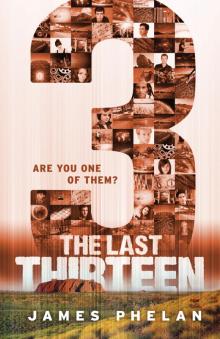 3
3 Survivor
Survivor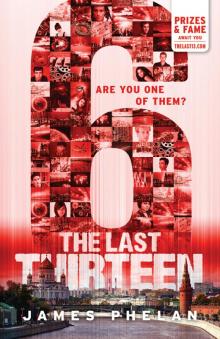 6
6 The Hunted
The Hunted Quarantine
Quarantine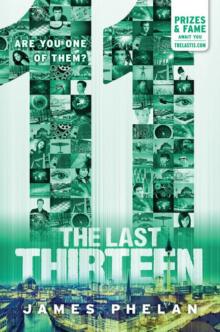 11
11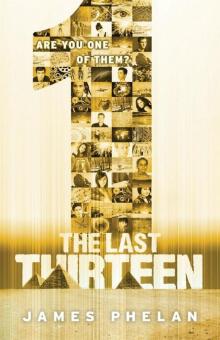 The Last Thirteen - 1
The Last Thirteen - 1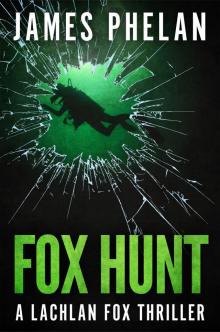 Fox Hunt
Fox Hunt 9
9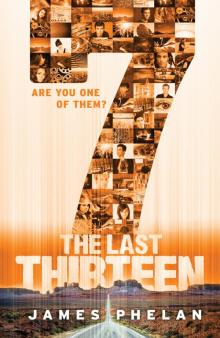 7
7 Patriot Act
Patriot Act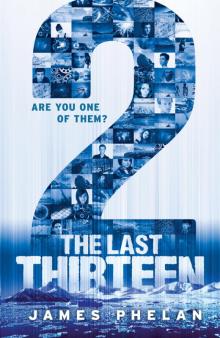 2
2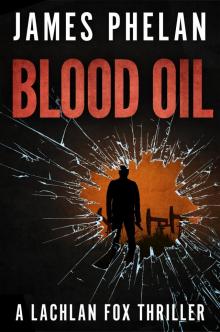 Blood Oil
Blood Oil Red Ice
Red Ice Chasers
Chasers Liquid Gold
Liquid Gold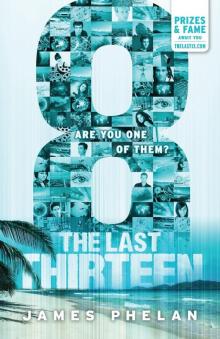 8
8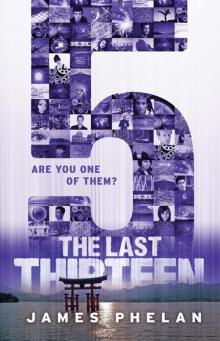 5
5 The Spy
The Spy Kill Switch
Kill Switch Dark Heart
Dark Heart